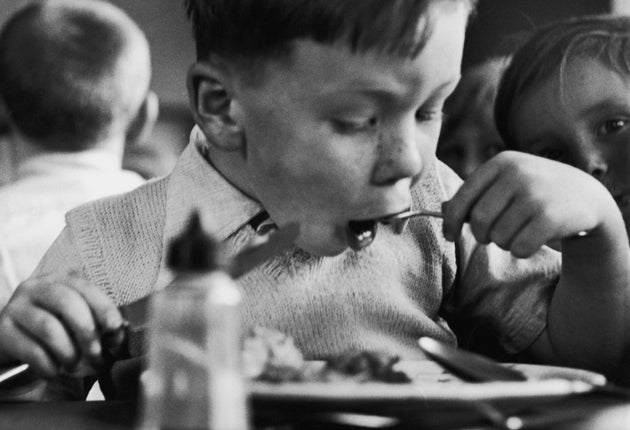Labour's free school meals policy would deliver nothing but headlines
Nick Clegg's offer, under the Coalition government, had all the hallmarks of a bright idea rushed too rapidly into policy. Now Jeremy Corbyn's opposition has followed in his footsteps

After trying on a lot of other hats – Lenin’s peaked number, the flat cap of the northern working man – Jeremy Corbyn has now donned feathered green felt as first sported by Robin Hood.
Labour’s latest policy, the first to gain national attention in almost a year, proposes the extension of free school meals to all primary school pupils in England and paying for it by introducing VAT on private school fees. He wants to be seen, quite literally, as taking from the rich to feed the poor.
There are some significant benefits of such a scheme. The first is that it acknowledges the huge socioeconomic divide between state school pupils in England, where a child’s engagement in the classroom, educational progress, and physical health and development are often directly linked to their parents’ income and level of education. Free school meals for all takes away one element of that disparity, as all pupils receive the same nutritional benefit each day, which can not only help them concentrate in the short term, but also cuts the risk of obesity and other health problems later in life.
Second, it removes the stigma of free school meals. Teachers sharing tales on social media of parents providing packed lunches for their young children consisting of only a single bag of crisps, two bars of chocolate or – in the most shocking case – a cold Mcdonald’s Happy Meal, serve to demonstrate how significant a factor pride can be in admitting the need for free school meals, and the depth of that nutritional divide.
The concept of universality is positive. However, implementing it in a political and social system that has, economically at least, turned its back on the concept is so tricky that it borders on the impossible. That is what the Liberal Democrats quickly discovered when they piloted a free school meals-lite policy while in coalition government with the Conservatives.
Back then, the proposal was to give all children under the age of seven the right to a free school meal, regardless of background. It was drawn up overnight, likely negotiated as part of a compromise agreement on one of the dozens of policies Nick Clegg and his team held their noses to pass into legislation while sharing the burden of power. It had all the hallmarks of a bright idea rushed too rapidly into policy.
Clegg’s promise for free hot dinners for pupils up to the age of seven was supposed to cost £600m. But that figure, described by head teachers at the time as a “back of a fag packet” calculation, did not take into account the cost of installing new kitchens in the hundreds of schools that did not have them. In the run-up, many schools said they may end up having to offer cold packed lunches instead, rather undermining the purpose of the entire project.
Not just the right, but a significant element of the traditionally ultra-left teaching establishment, questioned the idea of a universal benefit when so many families could quite easily afford the cost of school meals. It diverted, they warned, precious public money away from further investment in the neediest youngsters towards those who were already off to the best of starts. Pete Mountstephen, then the headteacher at St Stephen’s school in Bath and chair of the lobby group National Primary Headteachers, spoke for them when he said: “I serve a fairly affluent part of a fairly affluent city in a fairly affluent part of the country. We don’t need it … it’s a bizarre thing to do.”
Announcing its extension of that policy, Labour cited a 2012 report from the Institute for Fiscal Studies, evaluating the pilot projects introduced by the Coalition government. It found “increased attainment in disadvantaged areas”, but that is not a sufficient reason to further extend the policy; even more could like be achieved by better channelling of the funding that is available (whether through a wealth tax or other methods of pre- and redistribution) to pupils in the poorest areas facing the most significant barriers to achieving a good education. Though crucially important, such barriers do not begin and end with access to decent meal during the school day.
Adding VAT to the cost of private school fees in England will not sufficiently discourage the very wealthiest 7 per cent of parents who choose to educate their children outside the state sector. It will not break down the social structures that see less gifted but wealthy seven-year-olds outperform, in the job market some two decades later, those in the same cohort who are academically impressive yet are economically disadvantaged. And, should it be brought into practice by a future Corbyn government – that itself a considerably unlikely prospect – spending the yields of a Robin Hood education tax on feeding every single state school child until the age of 11 will only reinforce those social fences by giving an unnecessary handout to those who need it least.
Good job, then, that this idea will only ever see the light of day in the form of the one thing, we might suspect, it really was designed to achieve: headlines.
Join our commenting forum
Join thought-provoking conversations, follow other Independent readers and see their replies
Comments